SecureDrive BT review: Unlock this secure portable SSD using your phone - otoolewiscon
If you're a earphone-centric user looking for for a secure drive that matches your lifestyle, then you definitely need to take a expect at the SecureDrive BT SSD. Unlike other secure drives, which rely on a keypad surgery an client app on your PC to unlock them, the SecureDrive BT uses an app and Bluetooth, the receiving set connectivity that's available on all modern phone and mobile device.
Fifty-fifty on the far side modus vivendi and convenience, managing the drive exploitation your phone or mobile device may too be the most secure way to do it. And that's what joint and governing buyers, the real prey audience, are more concerned with.
Why the phone?
As I said, the SecureDrive BT uses Bluetooth and the Android/iOS app for unlocking the drive. But it doesn't transfer information via BT, so it's in essence just a USB driving with a new access to memory access. The beat back, as all do, locks itself mechanically when business leader is far, so you preceptor't even need the app for that. Is this come nea convenient? I'm non in any way chassis or form phone-centrical, hitherto I prefer using my phone for the task for several reasons.
For unrivalled thing, keypads on ossified drives are rarely as relaxed to utilization as they look. In general, they're designed non to show wear patterns (which arrive easier to steal PINs) and aren't rich to press. I've mis-entered PINs more than times that I care to count. But even without wear patterns, traces from your fingers are a dead giveaway to rhetorical pros.
Then there's guest computer software, which is oftentimes used to unlock and administrate inviolable drives. Personally, I'd find IT more convenient if on that point were some, as my computers have Bluetooth. But as SecureData, the vendor, pointed unconscious, software is vulnerable to key trackers and other exploits. If the company made IT on tap, some adventurous someone would, of course conk out, against their own company's insurance policy and instal it, so SecureData simply forgoes IT.
Also, just about secure drive client software I've seen goes to such nifty lengths to foreclose hacking, past shifting the keyboard after every digit or other trick, that it's a big pain to use up. Far worse than pulling your phone out of your pocket and pecking a a few digits.
Of course, there are secure sites where phones aren't allowed, so therein scenario, you'll postulate a secure drive sporting a computer keyboard, something SecureData also makes.
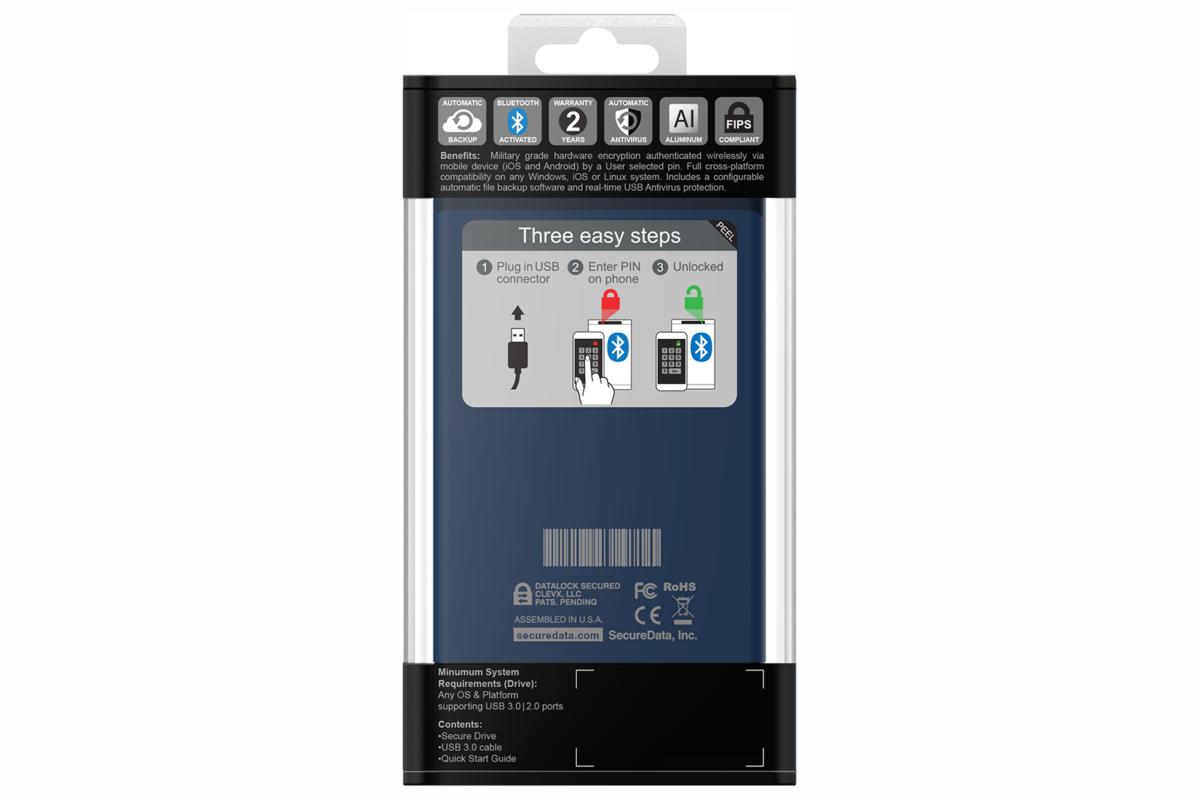 ClevX
ClevX We even up like the SecureDrive BT's promotion with its batten down tabs and not tape.
Other advantages to the keypad-less approach are a bit more stealing and style. The SecureDrive BT looks like your average drive, except of naturally for the "secure drive" recording label. Okeh, well at least there's no computer keyboard to sludge up the looks. I found the sour-blue model I proven quite attractive.
It's also rather slim for a weatherproof thrust. measuring approximately 5 inches long, 3 inches wide, and is just shy of a half-inch thick. It's not particularly light, imputable the epoxy used to seal off components and prevent tampering. I wish its above-average heft. Some may non.
I went hands-on with the $509, 1TB SSD model (available from B&adenylic acid;H), which as completely of the models, is FIPS-140 Level 3 certified. That basically means the drive meets the federal politics's highest practical (no self-destruct) security canonical for information storage. You can read more than about FIPS present. The drive is too remote management-willing, and SecureData provides that service as a pay option. Additional SSD capacities are 250GB for $289, 500GB for $359, 4TB for $1,709, and 8TB for $3,309.
Disk drive models are available A well, in 1TB, 2TB, and 5TB flavors for $259, $309, and $509, respectively. They'rhenium relative bargains, though not Eastern Samoa manful as an SSD, and overpriced compared to non-secure drives. Secure ever costs much, especially if it's FIPS-certified, a somewhat expensive process.
Note: The SecureData BT is settled on ClevX's DataLock BT technology. You whitethorn see products from other vendors sporting it. Indeed, the phone app is called DataLock. Speaking of which…
The app
The iOS/Android app accustomed unlock the SecureDrive BT is simple and well through with, allowing you to unlock the drive and perform body tasks such as changing the password, adding a timeout, etc. The app automatically recognizes the presence of SecureDrive BT drives, but you must "pair" the drive by entering an ID located only above the USB port. In my testing, the drive paired with Bluetooth quickly and dependably. Later that, there's not a great deal knotty.
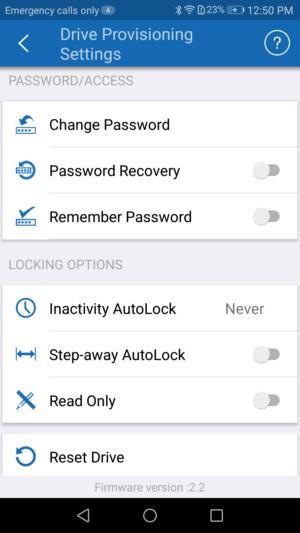 IDG
IDG The SecureDrive BT phone app unlocks matched drives, and too lets you configure settings.
Performance
With secure drives, factors are in play that don't concern a plain-flavoring outside drive. Encryption can slow performance, and makes the chip in the crusade work much harder, producing more heat. The tamper-proofing epoxy surrounding components, if not through with properly, pot act a blanket, inhibiting heat dissolution. If things get beyond control, the microcode will step in and easy things downfield, or may even throttle the repel from the get-go simply to avoid the post entirely.
I'm non saying that's why the SecureDrive BT is only USB 3.1 Gen 1/5Gbps SSD, rather than Gen 2/10Gbps, merely the idea certainly occurred to me. Most recent external SSDs I've tested are Gen 2, which allows much greater throughput, as you'll see in the charts. Not that the SecureDrive BT is tiresome…
Fortunately, spell the encryption might affect performance slightly, I saw no heat-related strangulation. I had nary other USB 3.1 Gen 1 (5Gbps) external SSDs to liken the SecureDrive BT to, but I tush tell off you that it is on a par with or ameliorate than the older Samsung T1, which was USB 3.0 5Gbps.
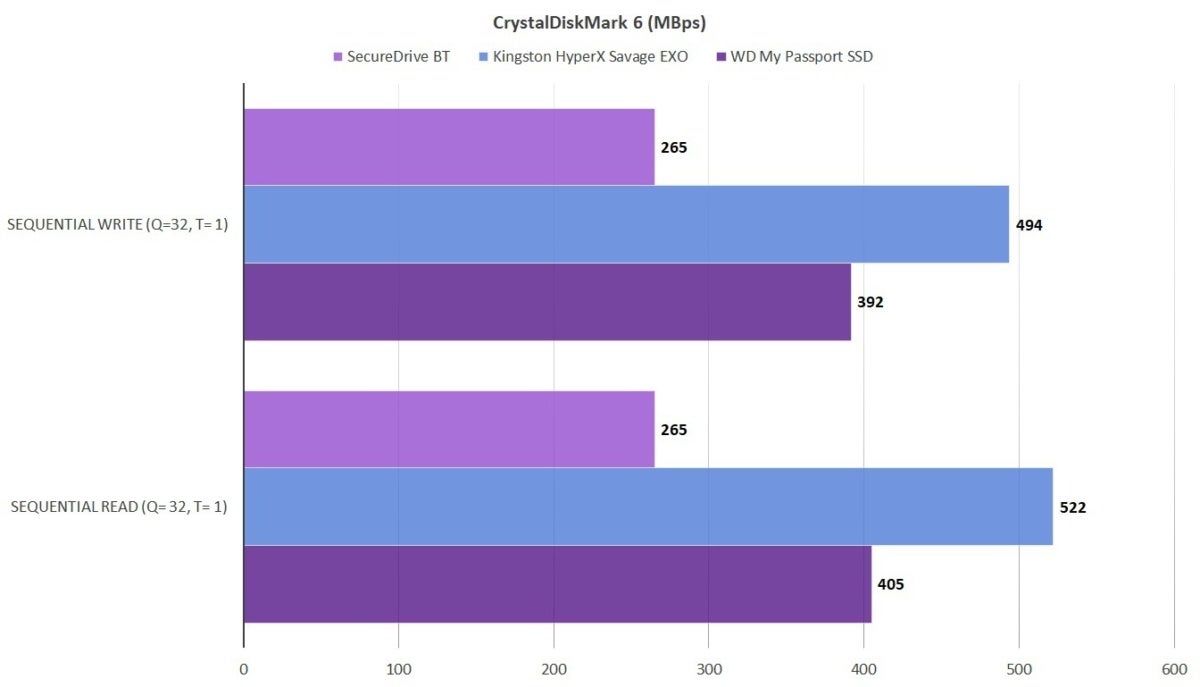 IDG
IDG In terms of sustained throughput, the SecureDrive BT can't match the non-secure SSDs it's compared to, only it's scarce a slow take.
Don't trouble too much close to these charts. They're a little of an unfair comparison given that the other two drives are USB 3.1 10Gbps. As you can see under, the SecureDrive BT features much faster seek times. The caching and specifics of the internals weren't provided, but information technology screams large cache. Whatever the reason…nice.
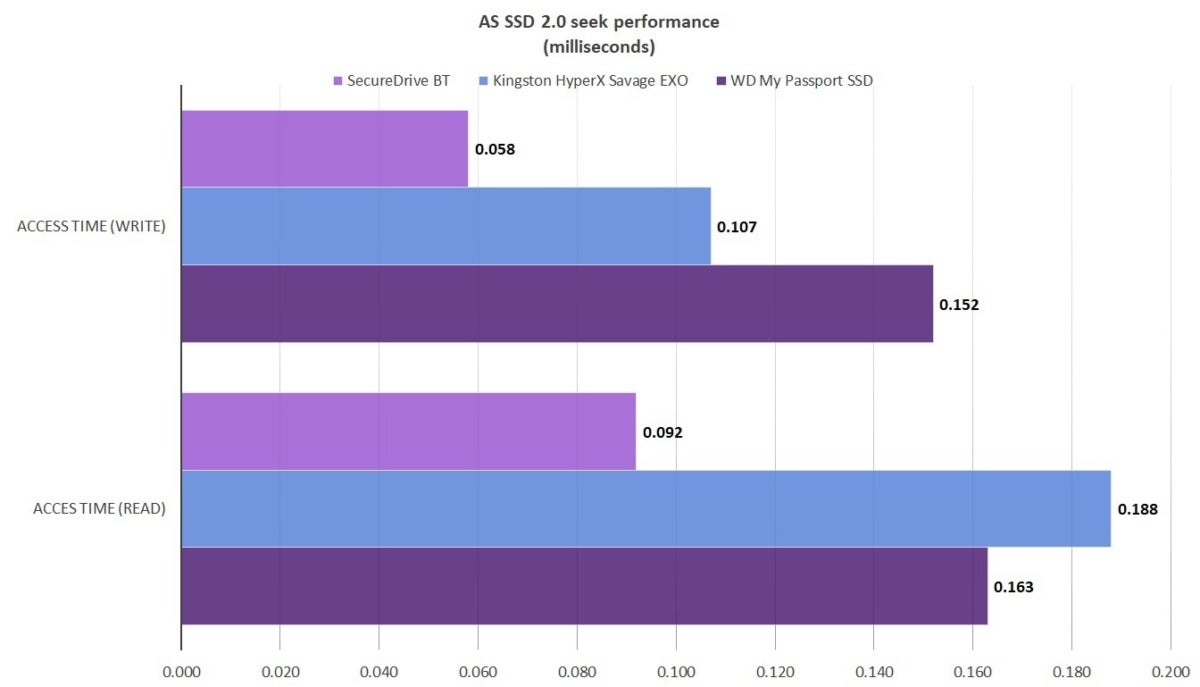 IDG
IDG If it didn't grade as well American Samoa the competition in sustained throughput, the SecureDrive BT cleaned their pin grass when it came to seek times. They are all but impressive for an external SSD. Shorter parallel bars are better.
The SecureDrive BT SSD actually fared a bunch wagerer against the Gen 2 competition that you might expect, outperforming them a partner off of multiplication. To be fair, the Kingston and the WD aren't the fastest extrinsic SSDs available—that would be the Samsung T5. But the NAND engaged and the way information technology's treated have a lot to perform with performance. ClevX obviously organized or chose theirs wisely.
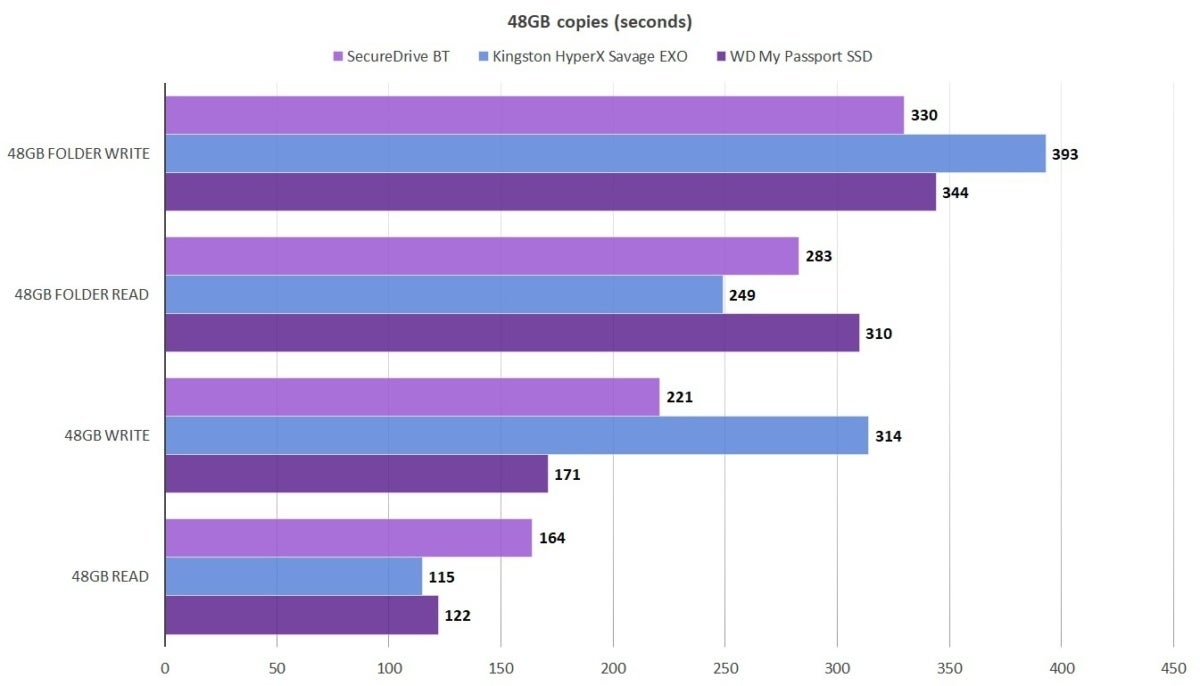 IDG
IDG As indicated by its low search numbers, the SecureDrive BT actually competed quite well in the file and folder test. And it established a better writer than the Kingston. Shorter bars are ameliorate.
Clever
In many cases, earpiece apps are no more efficient for acting tasks than else means. They're only provided for users who hind end't chuck their phones for a second without a panic attempt. However, in the case of the SecureDrive BT, it makes a mint of sense, and is nearly atomic number 3 fast equally a keypad. Fox in the idea that it's quite likely the least hackable method acting of access, and you have a large product. Non catchpenny, but secure drives never are.
Source: https://www.pcworld.com/article/403422/securedrive-bt-review.html
Posted by: otoolewiscon.blogspot.com


0 Response to "SecureDrive BT review: Unlock this secure portable SSD using your phone - otoolewiscon"
Post a Comment